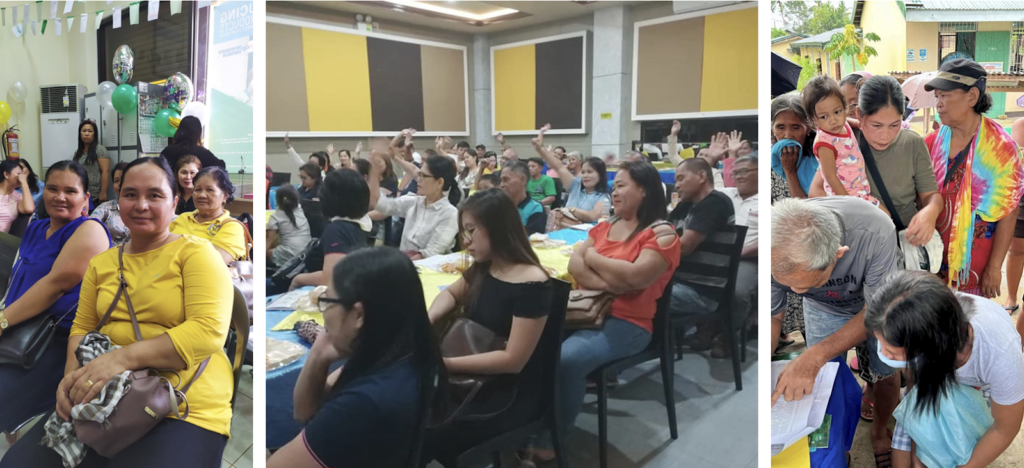A Watershed Moment

Grow members to grow the co-operative. This is the paradigm shift that will help ensure that co-operatives in Mindanao remain the people-centered enterprise envisioned by the pioneers. (Photo Source: Oro Integrated Cooperative Facebook Page)
In August 2016, MASS SPECC celebrated its 50th anniversary with the theme “50 years of growing co-operatives into a movement.” It captured the original thinking of the co-op pioneers in Mindanao that co-operatives were a movement of people, who aspired to develop themselves and their communities. This meant not only that members of the co-operative had to be active participants in its growth and development but also that the success of the co-operative enterprise translated into their well-being and in the improvement in their lives.
The theme also captured the ambition of the pioneers to see co-operatives working together so that they can contribute effectively to the economy and to society as a whole.
By 2016, co-operatives in Mindanao had already grown into multimillion enterprises. Some had even crossed the billion-asset threshold, earning the bragging rights of being billionaires. With all the external manifestations of financial growth already visible – buildings and offices comparable to established businesses, expanding network of branches, etc. – there was no escaping the question: have co-operatives become a real people’s movement, with the primacy of members at the core of their belief system? As the explanation on the theme of the anniversary noted:
As MASS SPECC celebrates its 50th year of existence in 2016, it may be well for present leaders, managers and staff of the federation and its affiliate co-operatives to ask themselves: Are the beliefs and the vision of the pioneers of the organization still relevant today? If so, how far have we realized that vision? If not, what is our alternative vision that is compelling enough to inspire the present and future generation?
These questions led to the collective reflection on the state of the co-op movement in Mindanao. Discussions and conversations around these questions transpired at all levels of the organization – from the co-operative clusters that make up the base of the federation to the regional ownership meetings to the general assembly.
Indeed, the 50th anniversary was a watershed moment that triggered internal reflections and a growing realization of the need for change.
A Growing Consciousness
One such realization was that co-op leaders and managers had been preoccupied with growing the business side of the co-operative enterprise. Growth was measured in terms of increase in assets, in deposits and share capital, in loan portfolio, in income and other financial indicators. Growth was also measured in terms of expansion in geographical reach with the establishment of branches in areas outside of home base as well as expansion of “customer” base with the increase in membership. Growth was also measured in terms of investments in new business undertakings that could contribute to a bigger bottom line.
This collective view of growth assumed and took it for granted that members, who are the main source of the co-operative’s capital and income, were the beneficiaries of such growth. After all, growth in loan portfolio meant more members had access to the co-operative’s products and services. And when the co-operative invested in business activities that did not directly address the needs and requirements of members, they would still benefit from the income coming these investments by way of more dividends – never mind if such dividends, on a per capita basis, were only marginal given that the average share capital of most members was relatively small.
This assumption, of course, did not hold water when viewed against reality. Not all members had equal access to the products and services of the co-operative. Neither were the benefits shared equally among them. In an independent study conducted in Mindanao to look into the state of well-being of members of co-operatives under MASS SPECC, it was established that at least 21% of members remained poor or became poor after 10 to 15 years of membership. In other words, not all members shared the growth story of co-operatives.
Fortunately, co-op leaders under the federation recognized this disturbing reality and decided to do something about it. In 2018, they decided to adopt a new vision for the co-op movement in Mindanao: all members enjoy better of life. This vision was adopted by most co-operatives as their own. And in a series of consultations from the ground up, they decided to translate this vision into reality. They agreed on economic indicators and measures to check on the well-being of individual members. And they agreed to monitor the achievement of this vision every year.
The year 2023 is the initial period the monitoring system has been put in place. Forty-eight (48) co-operatives have started gathering data from individual members. To date eleven (11) of them have completed the data gathering and they will form the first group of co-operatives that are able to have a complete profile of their members and establish their economic status.
More co-operatives are expected to join this effort next year and in the coming years. The data gathering will be done on a yearly basis in order to track the change in the economic status of members. Member-level interventions will then be undertaken to assist members, especially the poor and the low-income among them.
A Growing Commitment
Although majority of co-operatives under MASS SPECC have yet to join this effort, the fact that it has been started by some as an example means that a paradigm shift is already taking place, a shift that will place the primacy of members at the forefront of co-operative development and their well-being and welfare as the true measure of co-op success, as envisioned by the pioneers of the movement in Mindanao. The general assembly of the federation approved last year the 5-year Co-op Movement Strategic Plan which will institutionalize the strategy of “grow members to grow the co-operative.” The growing commitment of co-operatives under MASS SPECC to sustain the effort will surely change course of the co-operative movement in Mindanao. RMV

